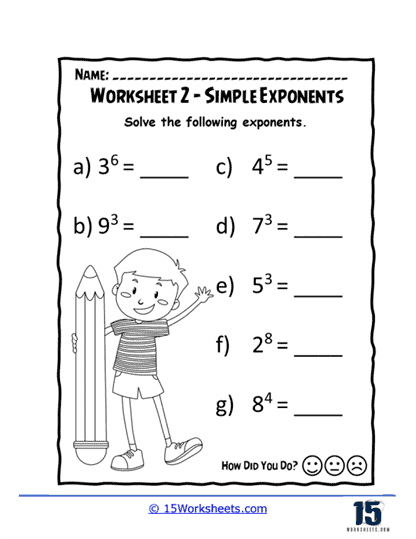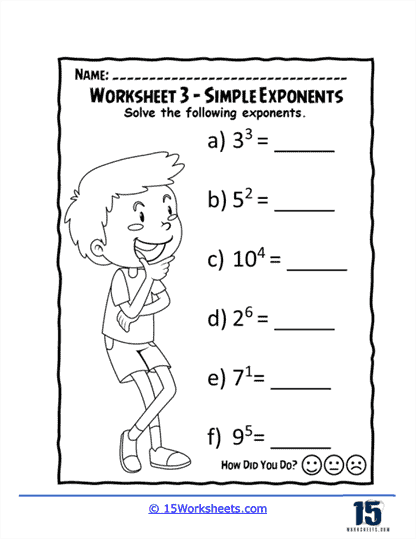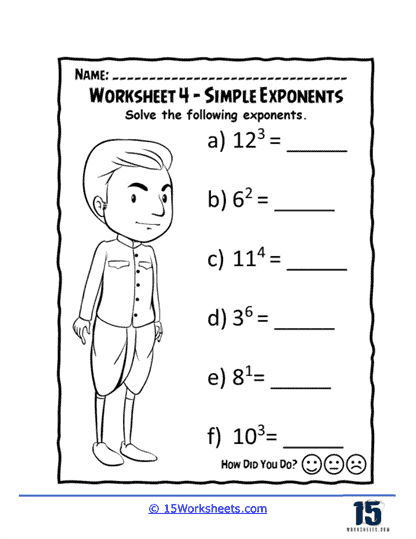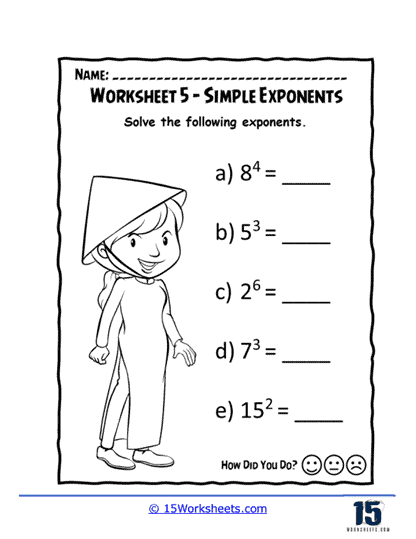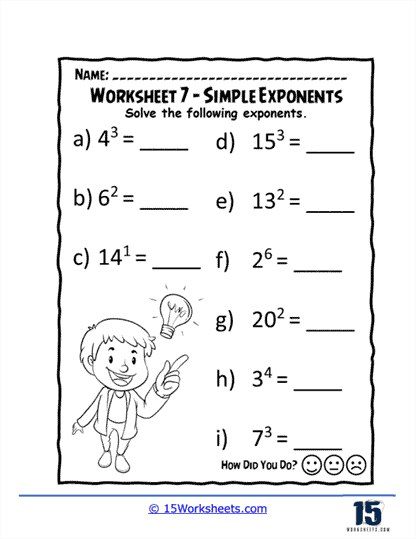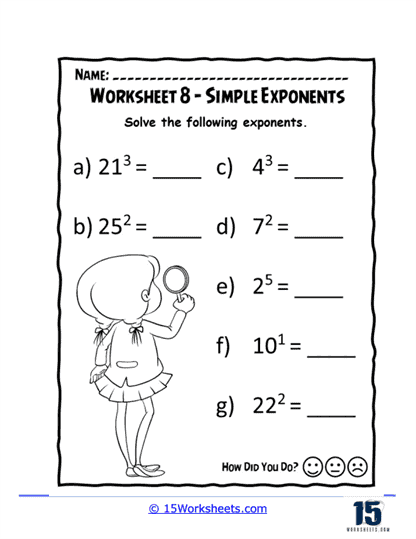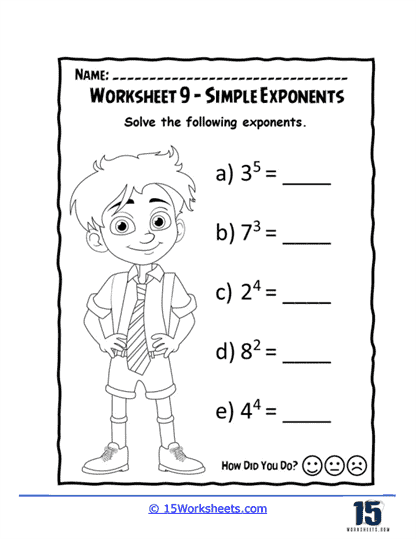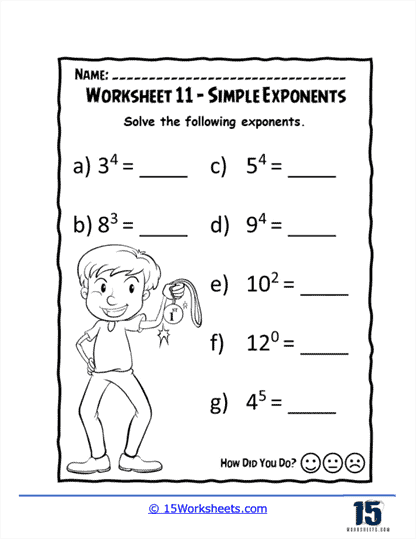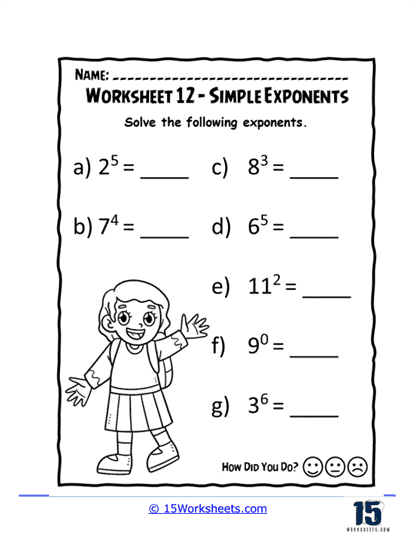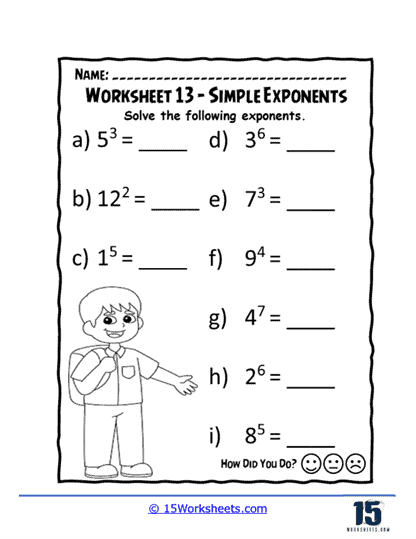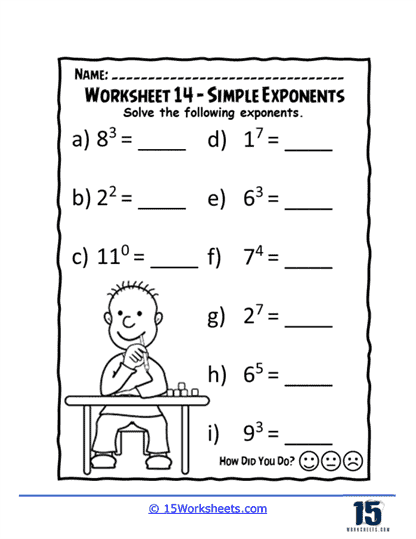Simple Exponents Worksheets
About These 15 Worksheets
These worksheets will introduce and reinforce the fundamental concept of exponents in mathematics. These worksheets aim to build a solid foundation in understanding and applying the rules of exponents through a variety of exercises. By engaging with these worksheets, students can navigate the complexities of exponential operations with greater ease, setting the stage for more advanced mathematical learning in areas such as algebra, geometry, and calculus.
At the core, exponents represent repeated multiplication of a base number. For instance, the expression 23 signifies 2 multiplied by itself 3 times (2 x 2 x 2). These worksheets focus on this basic principle, emphasizing the power and efficiency of using exponents to express large numbers and perform multiplications succinctly.
These worksheets are indispensable tools in the mathematics education toolkit, offering a structured and comprehensive approach to mastering the basics of exponents. Through a wide array of exercises, these worksheets not only enhance students’ understanding of mathematical operations involving exponents but also prepare them for more advanced studies and real-world applications. The skills and knowledge gained from practicing with these worksheets form a foundation that supports academic success and lifelong learning in mathematics and related fields.
Types of Exercises
To cater to a range of learning levels and styles, Simple Exponents Worksheets encompass various exercises, each designed to target specific skills related to exponents:
Basic Exponentiation – These exercises introduce students to the concept of exponents by asking them to calculate the value of simple exponential expressions, such as 32 or 53. This type of exercise helps students become familiar with the notation and the basic operation of exponentiation.
Writing Numbers in Exponential Form – Students are given large numbers or sequences of multiplication and asked to express them in exponential form. This practice enhances their ability to recognize patterns and understand how exponents can simplify numerical expressions.
Comparing Exponential Expressions – Exercises may involve comparing the size of numbers expressed in exponential form without calculating their exact values. These problems teach students about the relative magnitude of exponential numbers and how bases and exponents contribute to the size of the expression.
Multiplying and Dividing Powers with the Same Base – These exercises focus on applying the rules for multiplying and dividing exponents with the same base, such as xa x xb = xa + b and xa ÷ xb = xa – b. They help students understand how exponents interact during multiplication and division.
Powers of Powers – Students encounter expressions that involve taking a power of a power, such as (23)2, and learn to simplify them by multiplying the exponents. This type of problem introduces the concept of exponentiation hierarchy and the rules for managing multiple layers of exponents.
Zero and Negative Exponents – These exercises introduce the concepts of zero and negative exponents, teaching students that any non-zero number raised to the zero power equals one, and how negative exponents relate to reciprocals (x-a = 1/xa). This expands their understanding of exponents beyond positive integers.
Scientific Notation – Some worksheets may include exercises on expressing numbers in scientific notation, a method that uses exponents to simplify numbers with many digits. This is particularly useful in science and engineering contexts, where very large or very small numbers are common.
Real-World Problems – To connect mathematical concepts with practical applications, worksheets often incorporate word problems that involve exponents. These might include scenarios from physics, chemistry, or finance, where exponential growth or decay, scales, and rates are discussed.
The Benefits Of These Worksheets
Solid Foundation – Mastery of basic exponent rules through these worksheets provides a crucial foundation for more advanced mathematical concepts, including polynomial operations, logarithms, and the analysis of exponential functions.
Enhanced Numerical Fluency – Regular practice helps students become more fluent in handling numbers, particularly large ones, fostering a deeper numerical literacy that is valuable across all areas of mathematics.
Improved Problem-Solving Skills – By working through a variety of exponent-related problems, students develop versatile problem-solving skills. They learn to apply mathematical principles to abstract problems and real-world scenarios alike.
Critical Thinking Development – Exercises that involve comparing, simplifying, and applying exponents in different contexts encourage students to think critically about mathematical operations and the relationships between numbers.
Preparation for Advanced Studies – A strong grasp of exponents is essential for success in higher-level math courses and STEM fields. These worksheets prepare students for the complexities of algebra, calculus, and beyond, where exponents play a significant role.
Confidence in Mathematical Abilities – As students become more adept at working with exponents, their confidence in their mathematical skills increases. This confidence can lead to a more positive attitude toward math and a willingness to engage with challenging concepts.


